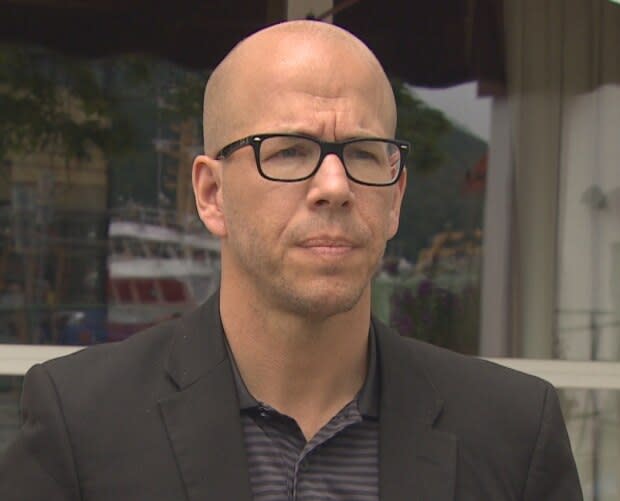No new COVID-19 cases in N.L., but health minister says travel expansion unlikely
While there are no new cases of COVID-19 in Newfoundland and Labrador as of Tuesday, the province's health minister says it's unlikely Newfoundland and Labrador's borders will open to more travellers before July is out.
John Haggie's comments Tuesday morning are the most concrete assertion to date that the provincial government has backed away from a Friday border expansion.
After discussions among the chief medical officers of health in Atlantic Canada, Haggie told CBC Radio's St. John's Morning Show not to expect non-essential travel from outside the region to be allowed as of Friday.
"I would be very surprised to see much significant movement before the end of this month," said Haggie.
Upon announcing the Atlantic bubble on June 24, Premier Dwight Ball floated July 17 as a date to possibly allow non-essential Canadian travellers from outside that bubble to arrive without requiring a written exemption and a 14-day isolation period. Since that time, however, he and other officials have walked back from that date.
"Same as the decision to open the 'Atlantic bubble,' any future broader movement to other Canadian jurisdictions or easing of travel restrictions for Newfoundland and Labrador will be determined and guided by our public health experts and chief medical officer of health," Ball said in a statement Tuesday afternoon.
"There has been no firm decision made on an expansion to a 'Canadian bubble.'"
Haggie emphasized Tuesday that the 17th "was simply arithmetic," coming 14 days after the July 3 opening of the Atlantic bubble. Two weeks is the incubation period of the virus, and the period of time the province has used in the past to transition between the easing of public health restrictions.
Since the bubble began, all four provinces within it have reported new cases of COVID-19, although in all cases health officials have stressed the cases have sprung from travel outside of the region.
"Our challenge now is what's the next sensible step and when should that be taken," said Haggie.

Haggie did point to declining numbers across the country as encouraging, but officials here are watching other jurisdictions' actions, noting that Ontario is still keeping its most populous areas in and around Toronto under lockdown despite easing restrictions elsewhere.
As of Tuesday's daily update, Newfoundland and Labrador continues to have one active case of COVID-19, tied to travel to the United States. There have been 20,827 people tested for the virus, an increase of 244 people since yesterday's update.
The updated numbers came via press release, as the next in-person media briefing is slated for Wednesday.
Also on Tuesday the provincial government released a directory of local personal protective equipment suppliers to help "consumers connect with local sources of PPE and to give suppliers a platform to reach potential consumers."
Minister Tom Osborne, who heads the province's Public Procurement Agency, said in a press release the online tool will help businesses continue to find the equipment they need to continue operations safely during the pandemic.
Watching P.E.I. closely
Haggie said health officials in this province are also keeping a close eye on the other Atlantic cases of COVID-19, particularly the most recent case in Prince Edward Island.
Contact tracing is now underway after a health-care worker in Charlottetown tested positive Sunday. That man had travelled to the island from Toronto, and as an essential worker was allowed to return to work, after first having an arrival screening test that came back negative.
After working seven hospital shifts, that man tested positive.
This is not a situation where there's much room for compromise. - John Haggie
Haggie said that case, along with a New Brunswick doctor who also did not self-isolate for 14 days, shows the flaws of screening tests and the importance of Newfoundland and Labrador officials' insistence on a quarantine period.
"The only screening test that we can rely on, and have relied on, is 14 days of self-isolation. Particularly of health-care workers," said Haggie.
"This is not a situation where there's much room for compromise."
P.E.I. Chief Public Health Officer Heather Morrison said Monday any further border openings for that province are, at this point, "premature."
Since the bubble opened, Haggie said, between 1,100 and 1,200 people a day are coming into Newfoundland and Labrador, compared with about 100 people a day during the height of pandemic restrictions in March and April.
The busiest border is between Labrador West and Quebec, he said, as Wabush, Labrador City and Fermont have bubbled together to allow their residents interprovincial freedom.
Tourism waiting on a boost
The tourism industry in Newfoundland and Labrador is still struggling to get by, relying on the majority of its business from visitors from abroad, many of whom won't be making the trip this summer.
Steve Denty, chair of Hospitality NL, told CBC News a Canadian bubble is important to the industry, but agreed July 17 was an arbitrary date, factored in after the opening of the Atlantic bubble, he said.

"It's a little disappointing to hear we won't be there that quick. I do think that there's some positive news coming since the Atlantic bubble has happened where people are realizing they can travel safely, people are getting around the province and exploring the Atlantic region with no real great consequences," Denty said.
"It seems to be that is working well. I hope the positivity can inform the next decision of when the Canadian bubble is expanded."
Denty said the tourism window is getting shorter, leaving prospective travellers with little time to make plans.
"I think that the expanded Canadian bubble is the real next opportunity for us. We need to get Canadians travelling around our own country safely. That's the next logical step," he said.
"I think the opportunities across our country are very strong, given where we are in battling the pandemic."
Read more from CBC Newfoundland and Labrador


